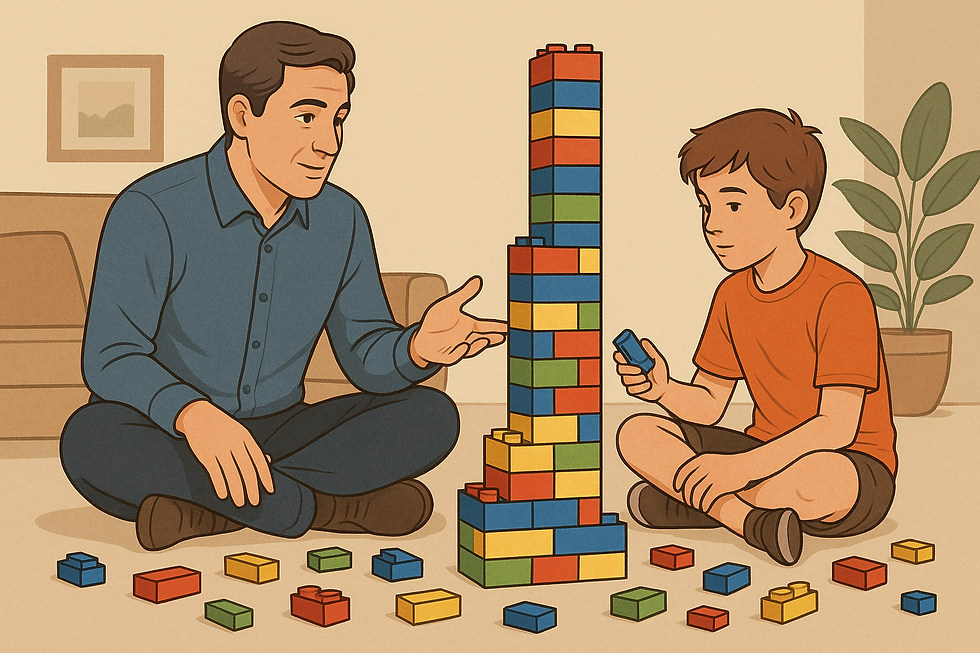Dad Role 5: The Hammer
- Mar 8, 2023
- 7 min read
Updated: Apr 11, 2023
Unlike the scary sounding title, the actual role of the Hammer is to end disputes or correct behavior when all other attempts have failed. The final word, if you will. This is the 5th of the 5 Roles of a Father in a household and builds upon the other roles I have discussed. As the Provider, Protector, Example and the Law, you are expected to carry yourself with all of the respect and integrity that comes with being a Father. If you are doing so, then your kids will know that you don't want to hit them because that would break Rule #1 (keep your hands to yourself) as mentioned in Role 4: The Law. It also means that if you say you will punish them if the behavior continues, you will do it. Because you follow through with your promises and are honest, as mentioned in Role 3 and 4. As the Hammer, you support your partner and make sure the family keeps their appropriate boundaries with respect and love.

THE 4 TYPES OF PARENTING STYLES
There are 4 types of parenting styles according to psychologists and parenting experts: Neglectful/Uninvolved, Permissive, Authoritarian and Authoritative. To better understand how to be the Hammer, you need to understand what these parenting styles mean and how they may need to adapt over time based on the child's age and needs.

Neglectful
Uninvolved or Neglectful parenting is a style of parenting where parents don’t respond to their child’s needs or desires beyond the basics of food, clothing, and shelter. Perhaps the parents are totally absent leaving the child for days at a time to fend for themselves. Perhaps the parents are closing themselves off completely in separate rooms and are unavailable to communicate with the child. Fairly simple why this is completely bad and wouldn't be helpful to a child at all. It is damaging to their psyche on several levels and carries several consequences that may hinder the child for life.
Permissive
This parenting style is the "no rules parent" who wants to be best friends with the child and may be uncomfortable with rules, punishments, guidance or discipline. This type of parenting style is also marked with a high amount of responsiveness but a low amount of discipline. For example, a parent who is always around and willing to spend time with the child, but unable or unwilling to be forceful and provide boundaries to the child. This could be harmful for the child long-term as they struggle to find boundaries with others, have trouble coping in difficult situations and may need additional support to handle normal stressful situations.
Authoritarian
This parenting style is the "drill sergeant" dad who only administers tough love. All rules and no play. All discipline and no hugs. This type of parent is extremely demanding on the child and not responsive when they have an issue or complaint. While tough love will make a child resilient, it can also hurt their ability to understand feelings, communicate with others or maintain a healthy loving relationship in the future. All children watch their parents as an example. If they emulate the drill sergeant's behavior in their future relationships, what kind of future marriage will that be? What kind of parent will they become?
Authoritative
This parenting style is a blend of the permissive and the authoritarian. It incorporates guidelines and discipline while also listening to the child and giving some space. This looks like the parent who asks what the child wants on the menu but also says no to ice cream if they didn't finish their meal. It looks like a parent letting the child choose what clothes they want to wear to school but making sure they eat a healthy lunch and did their homework. There is a very important distinction I want to make clear. The communication is the key difference between the tough love parent and the authoritative one. If you talk and set expectations, then you are being receptive. This is the sweet spot.
PARENTING THROUGH THE YEARS

As you can imagine, one size does not fit all for every child and every parent. In fact, one parenting style is not perfect especially when you factor in the age of the child. While doing some research on child psychology, I stumbled upon a mind-boggling fact. Children's cognitive ability and independence change rapidly and so will their requirements from you as a parent.
For example, from birth to 12 months the child's psychology is in mirror-mode while they learn how to communicate basic things like hunger, pain, affection, and emotions. They are discovering their surroundings with all of the senses and will require more attention, more direction and more boundaries. So let's call this 95% drill sergeant and 5% authoritative.
From 12 months to 3 years old, the child is moving more, exploring more and starting to communicate. This is the age where they really test the boundaries and begin to understand the world around them. Some space should be given to allow them to learn how to make decisions and also learning that some behavior is unacceptable. So let's call this level 75% drill sergeant and 25% authoritative.
From 3 years to 7 years old are the real learning years. If you research childhood early education, the child's memory from 2 until around 10 years is their fastest learning period. This is the time they will learn multiple languages easily, musical instruments and other academic pursuits. Likewise, they will continue to learn their environment including more complex ideas like the difference between rules and laws, what is a job and how money works. In this period, a Father especially in the role of the Hammer needs to understand how firm to be and how to let them grow and learn. Let's call this period 50% drill sergeant and 50% authoritative.
From 7 to 13 years old, the children are growing more independence as they start to explore a self-defined identity. They look for role models and peers to feed off of. They ask harder and harder questions that bring into light complex ideas like justice, an after-life, religion, politics and social paradigms. The parent should be there to correct negative behavior but start adjusting to a new parenting style where more things are discussions. For example, don't say "don't do that because I said so." Instead say "I don't think that's a good idea. Here's why..." Let's call this period 75% authoritative and 25% drill sergeant.
From age 13 to 17, the child will be fully engrossed in the exploration for an identity as well trying to understand what life will look like when they are an adult who needs to support themselves. They will seek more validation from peers and friends rather than their parents. This will be a painful period for the parents who felt themselves as best friends with their kids as the kids will be much more pre-occupied learning what other children their age are doing. Basically, a generational gap will emerge. The child will need much more independence to make their own decisions such as setting their own schedule, appearance, completing important tasks and turning in projects. Parenting a child of this age will absolutely test your patience and will require every bit of communication skills you have to conquer difficult topics like social media, sharing personal images, dating, overly-revealing clothing, safe sex or abstinence, and controlling time on electronics. Let's call this 90% authoritative, 5% drill sergeant and 5% permissive parenting.
DISCIPLINE
Your role as the Hammer will have to evolve over time to match the age of the child and what parenting style they need. For example, if your child is in the 3 to 7 age range and is throwing a tantrum, then you will need to talk to them in a direct but stern voice and let them know what they're doing is not ok. And if they keep going you will need to put them in their room to calm down. They will calm down and come out, probably still a little upset. As soon as they do, you should ask them what the fuss was all about but with emphasis on talking it out. You can't understand them if they're screaming, crying and yelling loudly. And you guys will talk it out and understand each other.
If you fast forward and it's a loud and unruly teenager, this sort of response won't work at all. They may be using loud or abrasive language. When you speak up to defend your spouse or to make them understand this is disrespectful, a shouting match may ensue. When you try to send them to a room, they will gladly go there with all the electronics they have and not come out for hours. With nothing solved, the problem and disrespect was never answered.
In this example, the younger child will be happy to sit and talk to you about their feelings. At the end they will feel comforted by the attention. On the flip side, the best punishment for an unruly teenager is to sit them down and have them talk it out. All they want to do is escape uncomfortable interactions and forcing them to sit down and explain their feelings and behavior will be exactly what they need to stop acting up. If you give these one-on-one talks a cute nickname like "family huddle" or something. Then you can use that phrase as a threat.
Very rarely have I ever had to resort to physically hurting my children. The threat of it plus the knowledge that Dad is much bigger and stronger than they are is usually enough. I love to rough house with my kids and they love it also. A couple good suplexes into a soft mattress will show them your full power. Then later, a threat of a spanking or something is enough to keep younger kids in line. If you have to go there with your younger child and resort to physically spanking them, only do so with your hand on the bottom and only do it enough to shock them. When they are shocked and crying, then the punishment is already enough. Also, it's a pretty scarring event in a child's memory, so you shouldn't use that sort of punishment frequently. Seriously, maybe only once or twice in their entire life did I need to resort to a physical punishment. Talking, time-outs, coaching, and threats have all been plenty to get the job done.
FINAL THOUGHT
The role of Hammer in the household is just as crucial as any of the other roles a Father needs to undertake. The discipline you give your children should be age appropriate as described above and not taken to extremes. Just like a judge has a gavel, so do you have the ability to end disputes in your household. Supporting your spouse may look like having to handle a child who has pushed far beyond their limits. Just remember this person is looking up to you as their greatest idol, their role model, and you don't want to tarnish that image by letting anger or stress dictate your actions. If you need a minute after getting home from work before handling a situation, talk to your spouse and take that minute. Then make sure you sound the ding of the bell and tag your teammate to join the royal rumble. Being a Father is simultaneously the most tiring and most rewarding thing in the world. Remember that when they all drive you crazy.



Comments